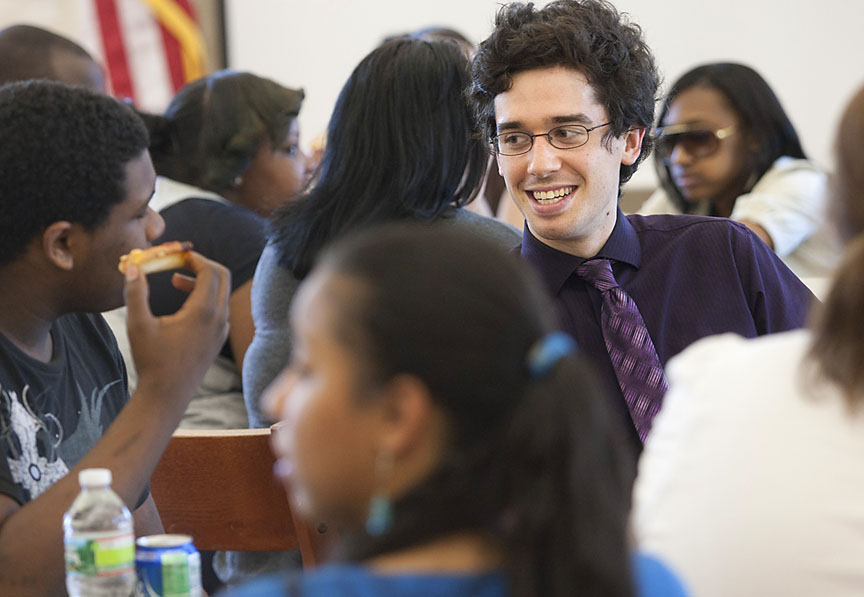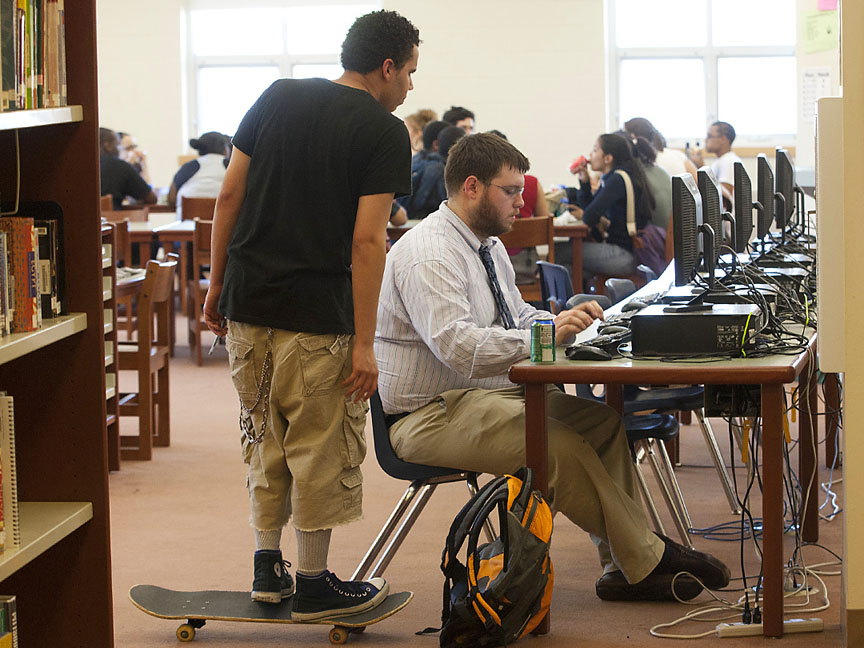Hugs, high-fives, and wild cheers greeted students as they made their way onstage at the Juanita Sanchez Educational Complex. It was Decision Day 2011 and these Providence public high school seniors had a lot to celebrate — nearly 100 seniors were being recognized for their future college, career, or military plans. Many of the students said they wouldn’t have been on that stage without the help of two recent Brown graduates, Joe Maurer ’10 and Caleb Miller ’09.
Maurer and Miller work full time as college guides part of the College Advising Corps (CAC), a nationwide initiative aimed at increasing college enrollment and graduation among low-income high school and community college students. Brown’s Corps, launched in 2007, is now one of 14 CAC institutional partners across the country. Housed at Brown’s Howard R. Swearer Center for Public Service, the program currently has guides working full-time in 11 high schools throughout Rhode Island’s six urban districts, plus one at the Community College of Rhode Island. College guides collaborate with guidance staff, principals, teachers, and others at partner schools to increase the awareness, preparation, and college-going disposition of underserved students. All of the guides are recent Brown or URI graduates.

At the W.B Cooley Health/Sciences Technology Academy and the Providence Academy for International Studies, where Maurer and Miller work, there is one guidance counselor on staff for every 200 students. The counselors are responsible for enrollment, disciplinary work, meeting with parents, and other day-to-day issues, which makes it difficult to help individual students with post-high school plans. As college guides, Miller and Maurer are there exclusively to help kids with college applications and decisions.
While running SAT preparation workshops, editing resumes and essays, and helping with financial aid forms, the guides clearly created quite a bond with the students. A group of 17-year-old students laughed as they recounted how Maurer tracked them down in hallways, classrooms, and the cafeteria this year to remind them about application and scholarship deadlines. “He would go anywhere just to talk to us. It feels like he cares ... I like that,” said Brian Hernandez, a URI-bound senior.
He does care. Maurer says the best part of his job is working one-on-one with the students — the meetings, getting to know their stories and goals, and giving them the tools and encouragement to achieve. News of acceptances and financial aid awards are always big moments too. Some students run into his office waving their acceptance letters; others have told him their news on Facebook. Miller and Maurer believe the fact that they are fresh out of college helps the students more easily relate to them. “There’s a level of trust and honesty,” Miller said.

“Joe’s been through what we’re going through, so he knows,” said Raymond Santos, a senior with plans to study aviation at Bridgewater State University next year. “He provided time, support, and information. ... It was there, but we didn’t know how to get it before. When we asked, he had it. When in doubt, go to Joe.”
In Rhode Island, which has the lowest college-going rate in New England and eighth-lowest in the nation, according to the National Center for Higher Education Policymaking and Analysis, there is evidence that the College Advising Corps is working. An independent evaluation found that students in schools with college guides are 14 percent more likely to attend college.
According to Janelle Clarke, principal of the Juanita Sanchez Complex, about 50 to 60 percent of the students are the first in their family (other than siblings) to be involved in the college application process, so the help is critical.
“I don’t know where we’d be if we weren’t able to have Joe and Caleb here to move our students forward,” said Clarke. “Often our students’ parents haven’t gone through this process, so they don’t have the discussions and dialogues with them at home.”
Decision Day at Sanchez was intentionally held at the very end of April — just a few days before most college-bound students needed to inform schools of their enrollment plans. On stage, Maurer and Miller recognized the smiling seniors who will pursue degrees in railroad science, nursing, public safety, culinary arts, and more at institutions including URI, Brandeis University, Johnson and Wales, McDaniel College, and the U.S. Air Force next year.
“Today is big because I’ve seen how hard it is if you don’t have a good education,” said Carolina Gomez, who will attend her “dream school” — URI — next year. “It’s hard to get by and to do things the way you want to do them. To not have to worry about that and to be able to say, ‘Yeah! I’m going to college’ ... It’s a good thing.’
Of course, Decision Day wasn’t just a celebration for the seniors. Wrapping up the event, Miller and Maurer dutifully reminded juniors to sign up for summer SATs, thus beginning the college application cycle all over again.

